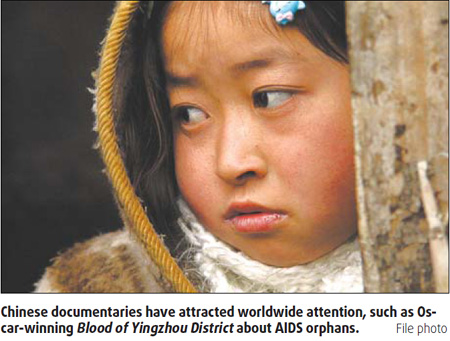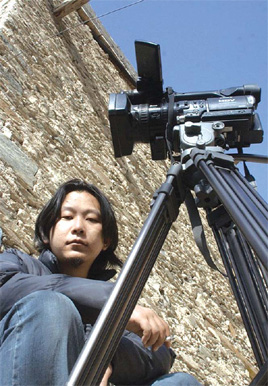
When Liu Chang arrived at a collapsed school in Beichuan, Sichuan province after last year's earthquake, making a documentary was not high on his agenda. As he walked around the ruins, however, the would-be volunteer was struck by how the once-bustling street had disappeared, high buildings ripped into pieces, schools covered by bricks, textbooks strewn all around.
It was the picture of a town submerged - and duty called. True to form, Liu was soon running around with his camera, talking with local people in the street.
"I was not sure whether I was going to come up with a full-fledged story then," says Liu, 33. "I was more concerned about letting more people know about what was happening in Beichuan. It was the center of attention then, everyone cared about the situation and about the people living there. We followed families, rescuers and volunteers to spread their voices around."
The result of Liu's hard work is the three-episode documentary "Reconstruction," which was shown at CNEX-UCCA theme documentary screening week.
Unlike his previous films, which were co-productions with Discovery Channel and told of life and art in China, the stories in "Reconstruction" are inevitably deeper and heavier. He interviewed people who had lost family members and houses, as well as those who were trying to help them out, but the spirit of the program is a call for hope.
"We saw people crying, complaining, downcast and even in despair, but the most important thing is that they were trying to restart their lives with hope," says Liu.
He stayed in Beichuan for a month to capture the city's changes and reconstruction.
 |
|
Director Liu Chang recorded how people reconstructed their homes in quake-hit Sichuan province. [File photo] |
"In the first part of the film, most people were seen enduring their pain," he says. "They lost everything but were fighting to stay strong.
"In the second part, however, more people were choosing to build up their home as soon as possible. They would carry any tools or furniture they could find for miles back to their temporary tents, such as clothes hangers, clothespins and cooking pans. They wanted to start a new life.
"I believe it shows a strong willpower and confidence at a time they were also suffering huge sadness and confusion."
Throughout the documentary Liu found that recording local people's activities was a kind of social responsibility. "I made the documentary partially for myself because that is real life, even amid such a natural disaster," he says.
A graduate of Beijing Film Academy, where he majored in photography, Liu has pursued a career as an independent documentary filmmaker. For nearly 10 years, he captured changes in society, like the demolition of Beijing's hutong.
"I am interested in filming how people have changed in the past few decades and how society's transformation has affected their lives," he summarizes. "This is what I think documentaries are about. So if you watch them again in five or 10 years, you can reflect on those images and consider how they changed."
Like Liu, many ambitious filmmakers in China try to tell stories from different cities but documentaries rarely make money or get much public attention. That may change with the rise of filmmakers like Liu as well as organizations that are willing to put their work on the screen.
CNEX chief executive Ben Tsiang believes documentary makers in mainland cities have led the way in capturing Chinese societies undergoing rapid changes. "Cities like Beijing and Shanghai contain rich sources for filmmakers," says the founder of China's biggest portal Sina.com.
"The outlook for the documentary market is not bright, however, even though China has yielded generations of talented directors."
To cultivate people's interest in documentaries and to nurture filmmakers, CNEX holds an annual film festival, showing movies from all around China and overseas. The organization also helps 10 filmmakers to make documentaries every year. "Our plan is to have 100 documentaries within 10 years," he says.
CNEX producer Hao Zhiqiang picks up the 10 directors from contests and online submissions. As he sees it, China has the conditions to be a hub for independent Chinese documentary makers. "There are many good documentary makers in China who are professional and inspired," he says. For those young directors, documentaries can bring together people of different backgrounds to discuss social issues, he says.
"Social awareness has increased in China in recent years and viewers will watch them as long as the stories are good and real."
Chinese documentaries have attracted worldwide attention in recent years. Du Haibin's "Umbrella" was made in 2006 and supported by CNEX. The five-part documentary about the growing disparity between cities and rural areas was shown at the Berlin International Film Festival to much acclaim. "The Blood of Yingzhou District," Ruby Yang's documentary about AIDS children in China, won an Oscar for Best Documentary Short Subject in 2007.
"Marketing might be the biggest hurdle for those filmmakers. It is a pity that much of their work slips under the radar. Documentary screening venues are rare in China," says Hao.
Nevertheless, the spirit for documentary making is high in China. Liu will this week set off hitchhiking with one of his friends, aiming to be in Berlin within two months. Liu's next documentary will focus on their adventures on the way.
"I make a movie about a way of life and want to share it with other people. It's important for a documentary to connect with viewers and play a role in society, either bringing tears or laughs, because what I am dealing with is not fiction but stories of flesh and bones."
(China Daily June 10, 2009)